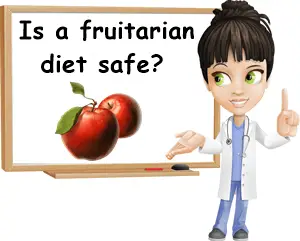Fruitarianism is a form of vegetarianism or veganism that advocates for a dietary regimen consisting of mostly raw fruits. It is in a sense a diet guided by ethical reasons and claimed to provide an ultimate form of nourishment that could prevent disease, strengthen the body, clear the mind and heal the soul. Nevertheless, fruitarianism is a restrictive diet, limiting a wide range of foods and excluding some essential nutrients. Despite short term benefits, it is believed to not be sustainable in the long term as a result of growing nutritional deficiencies that can produce severe imbalances and cause side effects such as altered pancreatic function or anemia.
What is a fruitarian diet? A fruitarian diet is defined as an eating plan that consisting of consuming mostly raw culinary, occasionally botanical fruits. Up to 75% of the diet should consist of raw fruits. Some fruitarians will also eat raw nuts and seeds or vegetables in limited amounts. An even smaller percentage will also eat honey, cocoa, chocolate and dried fruits. It is essentially a diet with emphasis on eating without harming plants or animals in any way. Some fruitarians will only eat fruits that have already fallen off the tree or bush or only those that rely on humans and other mammals for seed dispersal.

Is a fruitarian diet healthy? By excluding processed foods and animal products that are unhealthy especially when consumed in high amounts, the fruitarian diet provides benefits for the cardiovascular, digestive and immune system in particular. Lower cholesterol, better blood pressure levels, improved digestion, prebiotic benefits, constipation relief, high intake of anti-inflammatory antioxidants and immune-boosting nutrients are some of the purported benefits of a fruitarian diet. Sadly, no food known to man is universally healthy or good for every person and every condition and restricting your diet to a single type of food comes with its side effects over time, irrespective of how healthy that food may be.
The side effects of a fruitarian diet are more likely to appear with time as the body burns through its reserves of various essential nutrients such as essential amino acids from protein, vitamin B12 or essential fatty acids and cholesterol. And yes, cholesterol is in a sense an essential nutrient because it helps make up several structures in the body such as the myelin sheath protecting the tail of neurons. When said protective layer start degrading, it triggers the onset of diseases such as multiple sclerosis.
The brain, nervous and immune system rely heavily on the intake of complete protein containing all essential amino acids. Amino acids are important for synthesizing neurotransmitters that regulate appetite, mood, sleep and impact cognitive functions such as learning and memory. Vitamin B12 and cholesterol make up the myelin sheath protecting nerve cells. Vitamin B12 is also essential for the production of red blood cells, energy metabolism and development of babies in the womb.
Essential fatty acids like DHA Omega-3 are food for the brain and support cognitive functions. Immune system cells are made up of protein and rely on them for vital functions. And since fruit don’t contain all essential amino acids, vitamin B12, cholesterol or essential fatty acids such as DHA forms of Omega-3 and are typically low in protein, a fruitarian diet can negatively impact multiple systems and organs.

Depending on your age, whether or not you have any existing health issues, level of physical activity and individual nutritional requirements, a fruitarian diet can provide certain benefits in the short term and side effects in the long term. Easing into the diet is recommended to give the body time to adjust and respond positively to the dietary changes you are making. Now let’s see what are the potential benefits and side effects of a fruitarian diet.
Potential benefits
Here are some of the main advantages of being a fruitarian:
1) You get high amounts most vitamins, minerals and antioxidants from fruit.
2) Fruits have prebiotic properties, feeding good gut bacteria and help improve digestion.
3) Fermentation from fiber creates a healthy gut environment.
This leads to better absorption of nutrients and offers a certain level of protection against cancer.
4) A healthy gut environment stimulates the parts of the immune system located in the intestines.
5) A fruitarian diet helps relieve constipation and has benefits for hemorrhoids.
6) Promotes weight loss and prevents obesity and associated diseases.
These may include metabolic syndrome, diabetes, cardiovascular disease, certain cancers.
7) Boost in energy as a result of the high intake of simple and complex carbohydrates.
Although this also means frequent spikes in blood sugar levels.
8) You enjoy the anti-inflammatory properties of fruits.
9) Lower cholesterol, better blood pressure, low risk of cardiovascular events.
Potential side effects
But what makes the fruitarian diet bad for you? Here are the potential side effects of being a long-term fruitarian:
1) Fruits are rich in sugar which, albeit in natural form, causing spikes in blood sugar levels. Spikes in blood sugar impact insulin production and are dangerous for anyone with hyperglycemia, diabetes and pancreas problems because they put too much strain on the pancreas.
2) There is a lack of fats and protein to control the rise in blood sugar levels from the high carbohydrate intake. Over time, pancreas problems may develop, especially in those who do not ease into the diet, cannot adapt to it due or have particular nutritional requirements brought on by existing medical conditions.
3) The energy boost following a meal is short lived, hence the reason many people following a fruitarian diet experience a lack of vitality, weakness and fatigue (adrenal fatigue) even years into the diet. You need vitamin B12 to produce red blood cells, iron to help transport oxygen to muscles and protein to help build muscle mass and sustain physical effort other than cardio.
4) You are hungry all the time because carbohydrates in fruits are digested too quickly.
You have to eat larger or more frequent meals, plus it’s expensive.
5) Some people experience mood changes: agitation, anxiety, irritability, headaches, depressive states as a result of the constant hunger and nutritional deficiencies.
6) Lightheadedness, brain fog, poor concentration, low productivity due to the lack of vitamin B12 and low intake of fats. Aside from avocados, coconut and olives, most fruits have extremely low amounts of fat.
7) Vitamin A, D, E and K deficiencies are common as a results of a low fat intake. Although plenty of fruits have pro-vitamin A antioxidant carotenoids and vitamin K, as fat-soluble vitamins, they require fats in order to be absorbed. As for vitamin E, it’s found in fairly limited amounts in fresh fruit (example: papaya). Vitamin D, which we get from the sun, needs fats to be processed and absorbed optimally.
8) This creates a risk for skin, eye and other problems because, even though you get plenty of pro-vitamin A antioxidant carotenoids, you don’t absorb them well without fats in your diet. Or, better said, without a certain amount of fats.
9) Poor immunity due to low vitamin A and D absorption and poor protein intake. Vitamin A protects the integrity of mucous membranes (the eyes, nose, mouth, throat and lungs), the first lines of defense of the human body. Vitamin D is an important immune system modulator.
10) Anemia from low iron and no vitamin B12. Unless you supplement with synthetic formulas, as a fruitarian, you may be getting to little iron and vitamin B12 from eating just fruits.
11) Potential muscle problems due to low intakes of protein. The building block of muscle tissue, protein is essential for a well-defined, toned, healthy muscular system, strength and endurance.
12) Developmental problems of babies in the womb as a result of vitamin B12 and essential fatty acids deficiencies. Vitamin B12 and fatty acids such as EPA and DHA Omega-3 fats are essential for normal brain and nervous system development of the baby in the womb.
13) Tooth decay caused by citric, malic and other acids in fruits eroding tooth enamel. Being a fruitarian means eating large amounts of fresh fruits and most fruits contain various organic acids that damage teeth over time.
14) Poor bone density caused by calcium, phosphorus, vitamin D deficiencies. Just like you are likely to find vitamin C in fresh fruits rather than animal products, so are you likely to get phosphorus in the amounts you need from seafood, for example, rather than fresh fruit. An extremely restrictive diet has the potential to cause serious nutritional imbalances.
15) Loose stools, diarrhea, gas, bloating, abdominal cramps, too frequent stools (may be temporary, recurrent or constant). It may take some time until the body adjusts to a fruitarian diet and transit time regulates itself. Or it may be that some people are more sensitive to a higher fiber intake and will continue to experience frequent, loose bowel movements.
16) Malnutrition causing some fruitarians to appear too lean, pale or sickly-looking. It may be protein-malnutrition, B vitamins malnutrition or other nutritional deficiencies that affect overall health.
Athletes, runners, cyclists often see benefits when on a fruitarian diet because their physical activity requires them to consume high amounts of carbohydrates and fruits have mostly carbs. Promoters of the diet also recommend these types of physical activity to burn the high amounts of carbs, including sugars you consume in order to not disrupt insulin metabolism. So if you start a fruitarian diet, in addition to easing into it (think of the likes of 6 months to 1 year), you also need to start exercising intensively and supplement to get the nutrients you are missing so you experience as little side effects as possible.
Is a fruitarian diet sustainable nutritionally speaking?
Considering current knowledge of the nutritional requirements of the human body, a fruitarian diet would appear too restrictive to be able to sustain good general health over time. Weighing in on the advantages and disadvantages of fruitarianism, it can be concluded that the diet fails to offer a much needed nutritional balance for the average person because it excludes several essential nutrients from one’s diet and promotes excesses that could have an unknown impact on general health.
A vegetarian diet with emphasis on a generous intake of fresh fruit, vegetables, nuts and seeds and allowing a moderate intake of dairy products from ethical dairy farming, or fish products from responsible fisheries, is much more likely to meet nutritional requirements whilst addressing ethical, environmental and religious concerns. An omnivorous diet with an accent on clean eating, a high intake of fruits, vegetables, moderate intake of nuts, seeds, grains, eggs and low intake of dairy and meat products can also provide extensive benefits.
Conclusion
Everyone is and should be free to choose what they eat because, in the end, nobody but them will reap the benefits or suffer the side effects of their dietary choices. All that matters is that we make informed decisions, ease into new diets and, ideally, adapt our eating to our individual nutritional requirements, avoiding dangerous excesses. Only when we see ourselves as individuals and with individual nutritional requirements will we be able to make the right choices for us, whether it’s choosing a vegan, vegetarian, fruitarian or omnivore diet.
